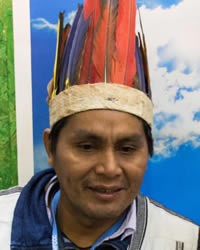Amarakaire, Harakmbet in Peru

Photo Source:
Climate Alliance Org - Flickr
Creative Commons
|
Send Joshua Project a map of this people group.
|
| People Name: | Amarakaire, Harakmbet |
| Country: | Peru |
| 10/40 Window: | No |
| Population: | 2,200 |
| World Population: | 2,200 |
| Primary Language: | Amarakaeri |
| Primary Religion: | Ethnic Religions |
| Christian Adherents: | 0.60 % |
| Evangelicals: | 0.50 % |
| Scripture: | New Testament |
| Ministry Resources: | Yes |
| Jesus Film: | No |
| Audio Recordings: | Yes |
| People Cluster: | South American Indigenous |
| Affinity Bloc: | Latin-Caribbean Americans |
| Progress Level: |
|
Introduction / History
The Amarakaire, an ethnolinguistic sector of the Harakmbut people, are a native Peruvian people group presently residing in the southern jungle region of Peru, specifically within the Madre de Dios region, spread across a wide area encompassing several river valleys. Despite their intricate ties with the region, their ancestral territories and rights have been threatened for centuries by invasions from the Incas, Spanish conquistadors, rubber barons, gold miners and oil companies.
Their community lived in relative isolation until the early 20th-century rubber boom, during which devastating epidemics introduced by traders decimated approximately 95% of their population. Seeking medical assistance, the Amarakaire established contact with a Dominican mission in 1951, marking a significant shift towards engagement with outsiders. Further interaction occurred in the 1970s with the construction of a road and the arrival of logging and mining companies, which increased their exposure to external influences. Subsequently, the Peruvian government designated their land as a reservation in the 1980s, affecting their traditional way of life.
Beginning in 1957, two field workers from the Summer Institute of Linguistics (SIL) initiated contact among the Amarakaire, culminating in the completion of the New Testament translation in 1986. Both Catholics and Baptists also made initial attempts to reach them, with Baptists establishing several churches before withdrawing in 1969. In the early 2000s, a mission agency collaborated with neighboring Shipibo and Yine tribes in an attempt to share the good news of the gospel with the Amarakaire, supported by additional efforts from another agency through chronological Bible storytelling from 2004 to 2009. This period saw the establishment of house churches, though many are no longer active today. Presently, while some believers remain scattered within the Amarakaire community, there is a prevalent resistance to both the gospel message and the presence of missionaries.
What Are Their Lives Like?
The Amarakaire live a daily subsistence lifestyle based on farming, fishing, and hunting and men commonly participate in logging or mining for gold to receive minimal wages from companies in the area. Traditionally, the Amarakaire adorned themselves with intricately painted red and black designs, sometimes painting their entire bodies from head to toe. Women wore skirts woven from tree fiber in addition to painting their bodies, and the people used feathers for adornment during special ceremonies. Historically, they lived in communal longhouses topped with palm-thatched roofs that reached the ground, where they slept on traditional thatch mats; however, they have since transitioned to living in intimate family homes while continuing to uphold their cultural traditions. Among the Amarakaire, coming-of-age rites have long held cultural significance. Presently, as individuals reach adulthood, they continue the tradition of changing their names, symbolizing their transition from childhood.
What Are Their Beliefs?
The Amarakaire embrace animistic beliefs that influence all aspects of life, leading most to seek solace in shamanistic rituals. Guided by ancient teachings, they perceive the interconnectedness of all living beings and elements, both physical and spiritual. Central to their beliefs is the concept of Wandari, a sacred space where the exchange between families, nature, and spirits occurs, maintaining the delicate balance between the visible and invisible worlds. The Harakbut people's spirituality centers around the concept of the 'Wanamey,' often referred to as the Tree of Life, which the people revere as a source of protection and salvation. According to their beliefs, the 'Wanamey' represents a sacred refuge and the embodiment of divine protection, especially during times of crisis.
The Amarakaire spirituality embodies a profound respect for nature's wisdom, recognizing its vital role in sustaining life and safeguarding their cultural heritage. Through myths and rituals, they seek to honor the intrinsic connection between the physical and spiritual realms, forging a deep reverence for the intricate web of life that envelops them in the Amazon rainforest.
What Are Their Needs?
The Amarakaire need comprehensive, culturally competent evangelization and discipleship initiatives that seek to nurture holistic faith in Christ. Establishing churches and training local leaders are crucial for sustaining spiritual growth and community support. Additionally, more sustainable alternatives to logging and mining are needed, emphasizing environmental stewardship, as protecting their lands and resources from external threats is essential for preserving their way of life and cultural integrity.
Prayer Points
Pray for the Amarakaire to encounter the Holy Spirit's power and glory, overcoming barriers that hinder their intimate knowledge of him.
Pray for the hearts of the Amarakaire people to be open and prepared to receive the truth of the gospel message.
Pray for sustainable economic opportunities for the Amarakaire that honor their environmental stewardship values and reduce dependence on industries like logging and mining.
Pray for the establishment of strong, indigenous-led churches among the Amarakaire, where believers can grow in their faith and support one another spiritually.
Please pray for the hearts of the Amarakaire to be turned once again to a desire for God.
Pray that the Amarakaire believers will pursue Christ, grow in sanctification and their knowledge of the word, and share their faith with their community.
Pray for renewed, Spirit-led mission efforts among the Amarakaire people.